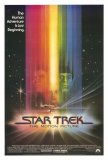Star Trek: The Motion Picture (United States, 1979)

It has been called everything from Star Trek - The Motion Sickness to Where Nomad Has Gone Before, but the theatrical arrival of The Motion Picture was without a doubt the most heralded event in the history of the Star Trek phenomenon, and the first time that a new adventure had been produced in a decade. As such, the late months of 1979 were heady times for Trek fans, and there was enough media exposure to pique the casual viewers' interest.
Star Trek: The Motion Picture arrived in the wake of Star Wars and, with Paramount's publicity department in high gear, the general public was expecting something as big, loud, and exciting as George Lucas' 1977 adventure. What they got instead was a slow-moving, occasionally thought-provoking, visually impressive science fiction yarn. Non-fans were bored, and even fans recognized that something was missing.
That "something" was the warm, lighthearted character interaction which had been the best part of the television series. While the rapport is still there, it isn't until late in the movie when Kirk (William Shatner), Spock (Leonard Nimoy), and McCoy (DeForest Kelley) start relating to each other with the same mix of wit, sarcasm, and friendship that characterized their relationship on the small screen. The familiar confines of the Enterprise have changed as well, becoming cold and harsh, primarily as the result of garish lighting and pastel costumes.
The story is cerebral, with little in the way of space battles or other action. It is also, unfortunately, a re-hash of several old Star Trek episodes combined and re-arranged ("The Changeling" being the most obvious "inspiration").
A massive energy cloud is on a direct heading for Earth, destroying everything in its path. The newly-revamped U.S.S. Enterprise, the pride of Starfleet, is the only ship available to intercept the intruder. Admiral Kirk, seeing a chance to get back into space after spending several years behind a desk, takes command of the mission from Captain Will Decker (Stephen Collins), who had been named to his current position at Kirk's own recommendation. With a mostly-familiar crew, the Enterprise sets out from drydock for a rendezvous with the cloud and the intelligence controlling it - a mysterious, totally-logical creature called V'ger.
Had The Motion Picture merely suffered from a lumbering plot or awkward characterization, it would have been remembered more kindly than is commonly the case. But the film makes an already-somnambulant storyline inert through the inclusion of an interminable special effects sequence as the Enterprise enters the cloud. For something like twenty minutes, the audience is treated to views of the characters gaping at the kaleidoscopic wonders of V'ger's inner regions as Jerry Goldsmith's haunting musical score plays on. In fact, though, as inappropriate as the composer's rousing main title is, his incidental themes work well at setting and maintaining moods.
Thematically, The Motion Picture remains close to the original intent of Star Trek. Despite the blunder of overburdening the middle portion with too many pretty images, the film is still about ideas - specifically, the need of every creature to evolve beyond its current constraints, and the importance of imagination and creativity in that process. Once the Enterprise has docked within V'ger and the plot sputters back to life, things become interesting again. Those not lulled to sleep will find themselves captivated by the exploration of these issues.
None of the actors do terrible jobs, although two more accomplished thespians might have made something more of the tension between Kirk and Decker than Shatner and Collins are capable of doing. Persis Khambatta, joining Collins as a newcomer to the Enterprise, upstages no one with her limited skills.
Perhaps the greatest strength of Star Trek: The Motion Picture is that, despite a badly-paced middle, it boasts a strong beginning and end. The movie is more enjoyable on video than in the theater (a few character-building sequences have been added) since the special effects are less dominating. After all, beneath all the glitz, there is a legitimate Star Trek story struggling to escape.
Star Trek: The Motion Picture (United States, 1979)
Cast: Stephen Collins, William Shatner, Leonard Nimoy, DeForest Kelley, Persis Khambatta
Screenplay: Alan Dean Foster and Harold Livingstone
Cinematography: Richard H. Kline
Music: Jerry Goldsmith
U.S. Distributor: Paramount Pictures
U.S. Release Date: 1979-12-07
MPAA Rating: "G" (Profanity, Violence)
Genre: SCIENCE FICTION
Subtitles: none
Theatrical Aspect Ratio: 2.35:1
- Because I Said So (2007)
- Star Trek: The Motion Picture (Director's Cut) (2001)
- (There are no more better movies of Stephen Collins)
- First Wives' Club, The (1996)
- (There are no more worst movies of Stephen Collins)
- Star Trek II: The Wrath of Khan (1982)
- Star Trek III: The Search for Spock (1984)
- Star Trek IV: The Voyage Home (1986)
- Star Trek II: The Wrath of Khan (1982)
- Star Trek III: The Search for Spock (1984)
- Star Trek IV: The Voyage Home (1986)
- Star Trek V: The Final Frontier (1989)
- Star Trek VI: The Undiscovered Country (1991)
- (There are no more worst movies of Leonard Nimoy)
Comments